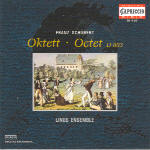Schubert wrote his Octet in 1824, on commission from Ferdinand Count Troyer, who suggested that the piece should be fashioned after Beethoven’s Septet for mixed winds and strings, which had become immensely popular. Schubert added one more violin to the scoring to increase it to octet proportions, but did imitate the number and character of movements: two dance movements, an adagio, a theme and variations, these four sandwiched in between virtuoso first and last sections. Using the scoring of string quartet plus double bass, clarinet, horn, and bassoon, Schubert created rich, dark, autumnal sonorities in a large piece that lasts a little over an hour when repeats are taken. The German Linos Ensemble does nothing to speed things up; its tempos for slower movements are broad and expansive, yet never drag or seem slow. The dance movements and allegros bubble along at an amiable pace, and the variations of the fourth movement each have a distinctively different character. The playing is first rate, and all things considered, this becomes a preferred performance, without eclipsing the ultimate charm and correctness of the Vienna Octet’s reading, recorded in that ensemble’s estimable hey-day. The likable Capriccio recording sounds as dark and rich as the work itself, slightly favoring the clarinet and horn, with just a smidgen too much reverberation.
































